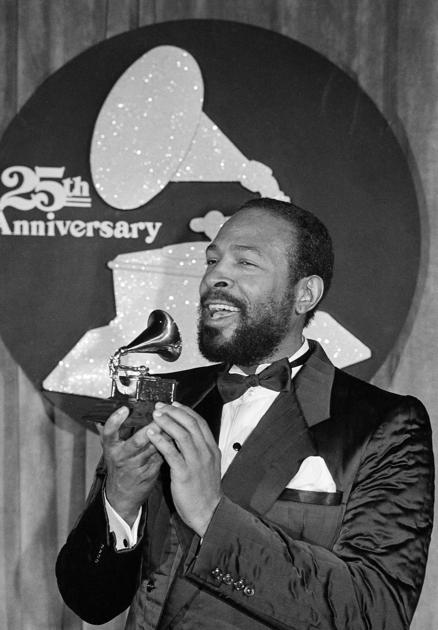
Motown was not well known for its politically conscious music. Then came “what’s going on”.
Released on May 21, 1971, at the height of the Vietnam War, Marvin Gaye’s album became a monster, producing three hit singles on the way to becoming Motown’s best-selling album to date. The album also marked a turning point as an artist for Motown and Marvin Gaye.
As an American racial and cultural scholar and host of the weekly radio show Soul Stories, many of the themes gay explores are still relevant today, as they were when they first wrote them 50 years ago. I was impressed with what remained. ..
Some of the songs on the album speak directly to the state of the world in the early 1970s.
In the timeless lyric “War is not the answer, only love can overcome hatred,” the title track condemned the state’s involvement in Vietnam. However, this song clearly provides insight into the evolution of gay music to cover political themes.
“What’s Going On” contrasts with his previous work during the Vietnam War, which presents a different perspective. For example, the first single of the gay second album “That Stubborn Kinda Fellow” in 1962, “Soldier’s Plea”, clearly offers a romantic view of war.
My loved one, how often do you think of me while I’m away?Remember, I’m here and fighting to keep us free, just my little girl, always true, and I’ll be a soldier boy loyal to you
“Soldier’s Plea” fits well with Motown’s early business model. Founded Tamla Records in 1959 and Motown Record Co a year later. Berry Gordy, who incorporated it as, and the songwriter he brought in, largely avoided political content.
Motown singers such as Mary Wells, The Supremes and The Temptations were supposed to be “young American sounds” rather than political activists, as the label says. “I didn’t want Motown to be a civil rights mouthpiece,” Gordy told Time magazine in 2020.
The lyrics of the song did not explicitly mention the ongoing civil rights movement nationwide in the 1960s, but Motown did not completely ignore racial politics. The label released the spoken word album “The Great March to Freedom” on August 28, 1963, the same day as the March on Washington. This release was featured in commemoration of Walk to Freedom, a major march in Detroit since the beginning of the summer. Speech by Martin Luther King Jr.
Motown also created the Black Forum label, which published other political speeches by King, including 1967’s “Reason for the Vietnam War” and Stokely Carmichael’s song “Free Huey.” We plead for the release of fellow Black Power leader Huey Newton in 1970. The label has also released an album of poetry by Amiri Baraka, Elaine Brown, Langston Hughes and Margaret Danner.
However, in general, early releases of the Motown label were limited to non-political ones.
But the world changed by 1971. The free struggle has undergone a more radical shift with the advent of the Black Power movement, the Chicano movement, the Young Lords and the American Indian Movement. The first Earth Day, April 22, 1970, focused on a new environmental movement in the United States. Meanwhile, anti-war activists protested the draft, escalated violence, and saw body bags return from Vietnam.
The soundscape of American music has changed with these political, social, and economic changes. Art and politics merged through the 1969 Woodstock Festival. Meanwhile, the Black Power-led message is soul and gospel music distributed by the Stax label in Memphis and many other musicians who provided criticisms of the burning of American imperialism, such as Nina Simone, Curtis Mayfield, and Gil Scott-Heron. Began to be emitted from.
National horror love
In addition to this political change, Motown had internal pressure to give artists more agencies for their work. As Motown performers matured artistically, some were overwhelmed by Gordy’s models and demanded more artistic control.
Gay created his own “What’s Going On,” a revolutionary act in Motown. The result is a painfully beautiful protest album, from the first track to the last track.
The opening line of the album is sung gently but urgently. “Too many moms, moms, crying / brothers, brothers, brothers, too many dead.”
The lyrics address the impact of war on the lives of families and young men sent abroad. The next song follows one of the young men in the country’s hometown struggling with an unemployment rate of 6%. “My friend, I can’t find a job, I can’t find a job,” Gay laments, “What’s happening to my friend?”
The last track on the album conveys frustration: “I want to scream how they are doing my life … this isn’t alive, this isn’t alive.”
In the meantime, we conclude with a refrain, from the quest for faith to the national anthem of environmentalists, “Mercy Mercy Me (ecology).” [the earth] stand? “
However, “What’s Going On” expresses hope. Gay repeats the affirmation “straight” with the entire album and the song with its name. This is a phrase that is clearly based on the words of the black city. This phrase is first heard on the title track “What’s Going On”. Gay asserts that he is “correct, brother” to a man who responds kindly to various points in the song. Call and response conveys a common sense of concern, a common struggle, and a common sense of redemption. Gay is a spirit taken from the gospel tradition of his musicality.
This call and response is repeated in “Wholy Holy,” and gay uses multi-tracking technology to layer two versions of his vocals.
We can conquer hatred forever (Lord) Who (who is holy, who is holy) We can shake the foundations of the world
Still a hit
Gordy was initially reluctant to embrace new gay directions. But Motown couldn’t ignore the success of the album. The title track reached the top spot on the Billboard R & B chart and peaked at No. 2 on the Hot 100. The album remained on the chart for 58 weeks.
[Over 100,000 readers rely on The Conversation’s newsletter to understand the world. Sign up today.]
Gay classic albums are still sympathetic to the audience as they celebrate their 50th anniversary. The Mercy Mercy Me (ecology) environmental message, like the powerful statements about race, war and poverty on other tracks, is as closely related today as it was in 1971.
As a music history course teacher in the United States, I noticed that most students were immediately aware of the songs on the album “What’s Going On,” which was released decades before they were born. In a country where people continue to protest white supremacy, endless warfare, environmental damage, police atrocities and poverty, “what’s happening” remains relevant.








